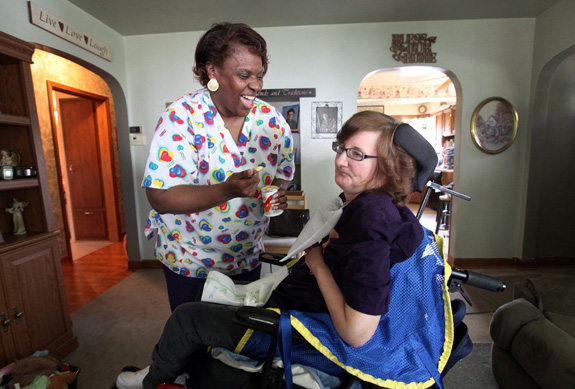Feds Delay Enforcement Of New Caregiver Pay Rule

Queen Garner, a home health aide, left, jokes with Susan Werth at Werth’s Milwaukee home. A new federal rule taking effect in January will require that most direct care workers are paid at least the federal minimum wage. (Kristyna Wentz-Graff/Milwaukee Journal Sentinel/MCT)
The Obama administration says it will delay enforcement of a new rule granting federal minimum wage and overtime protections to in-home care workers who assist people with disabilities.
The rule, set to take effect Jan. 1, mandates that most home care workers be paid at least the federal minimum wage of $7.25 per hour and qualify for time-and-a-half for working more than 40 hours per week.
However, officials with the U.S. Department of Labor said this week that while the rule will take effect in January as planned, they will hold off on enforcing the requirements for six months. Subsequently, the Labor Department will “exercise its prosecutorial discretion” to determine whether to bring enforcement actions for the period between July and December 2015, the agency indicated.
Advertisement - Continue Reading Below
The move comes amid lingering concerns from states, industry groups and some disability advocates about added costs and unintended consequences from the changes. The Labor Department said that some states are ready to implement the rule but others including Kansas, Oregon, Maryland and Pennsylvania have asked for more time “because of budget and legislative processes.”
The enforcement delay is not easing concerns from self-advocates with ADAPT. The group is worried that agencies employing in-home care workers will resort to capping hours. As a result, people with disabilities could lose longtime caregivers and potentially be forced into institutional settings, the group indicated.
“Agreeing not to enforce a law is not the same as delaying the implementation of a law,” said Stephanie Woodward, a disability rights attorney and ADAPT activist from Rochester, N.Y.
Meanwhile, the Paraprofessional Healthcare Institute, which advocates for the direct-care workforce and supports the new rule, said the delay will shortchange caregivers.
“The decision to delay means that two million home care workers — largely low-income women, and disproportionately women of color — will have to wait as long as another 12 months to receive even the most basic labor protections, guarantees that most other American workers take for granted,” the group’s president, Jodi M. Sturgeon, said in a statement noting that states have had 15 months to prepare for the changes.
Fifteen states already grant minimum wage and overtime protections to direct care workers and an additional six states and the District of Columbia require such workers to be paid the state minimum, according to the Labor Department. The new rule will extend such protections to in-home care workers nationwide.
Previously, these caregivers have been classified as “companions” in federal regulations — much like baby sitters — and were not granted the same rights as other types of employees.
Read more stories like this one. Sign up for Disability Scoop's free email newsletter to get the latest developmental disability news sent straight to your inbox.


